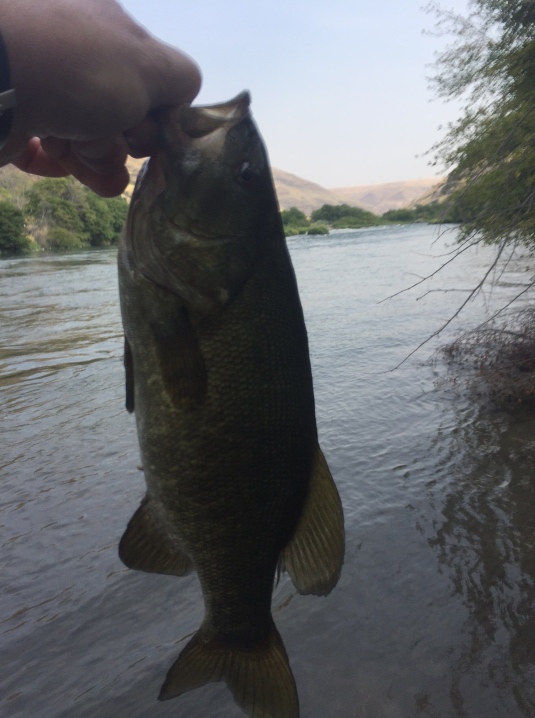On Friday, August 4, 2017, the Oregon Fish and Wildlife Commission voted to make the bass fishery in the lower Deschutes River a “no bag limit” fishery, beginning January 1, 2018.

A smallmouth bass caught last week on the lower Deschutes River.
This is a positive step toward dealing with the bass invasion of the past few years. It is also an acknowledgement that we have a problem in the lower Deschutes River. As we’ve noted in previous blogs, bass have been infrequently reported in the lower Deschutes River, in very small numbers, for many years. However, in the past two years the numbers of reported bass have grown significantly, with some anglers this year reporting catches of up to 20 bass per day below Macks Canyon.
These omnivorous and voracious predators feed on a mix of food types including juvenile fish (trout, steelhead, Chinook, shiners, etc.), crawdads, and aquatic insects. As their numbers increase, they pose an increasing threat to the ecology of the lower river.
Unlike in other fisheries where bass have been artificially introduced by well intended, but ill-advised, amateur biologists, the bass in the lower Deschutes River appear instead to have moved up from the Columbia River. This has happened because, remarkably, the lower Deschutes River is now warmer in the spring than the Columbia River. This is due to current selective water withdrawal operations at the tower above Round Butte Dam. During springtime, 100% surface water withdrawal is used to attract juvenile fish to the fish collection facility at Round Butte Dam. This surface water is many degrees warmer than water at the bottom of the reservoir, which was the source of water for dam operations prior to 2010.
The warmer water in the lower Deschutes River attracts bass and allows them to become more active earlier in the year. This gives them more time to feed before the next winter, and an earlier start on spawning.

DRA Board member Steve Pribyl with a smallmouth bass caught last summer.
Perhaps the saddest comment on the new bag limit is that most anglers are releasing the bass they catch in the lower Deschutes, in order to have something to catch in the future as this treasured river continues to change so rapidly. However, we would encourage all anglers to remove these fish from the water. Do not dispose of them on the bank, as that is a violation of rules regarding wasting of game fish.
The need for this change in fisheries management is another unanticipated and unintended consequence of SWW tower operations. And another sign that it’s time to reconsider how the tower is operated, along with current strategies for reintroducing fish above the Pelton-Round Butte Project.
Deschutes River Alliance: Cooler, cleaner H2O for the lower Deschutes River.
Click here to Donate.
Click here to sign up for the Deschutes River Alliance email newsletter.
—
